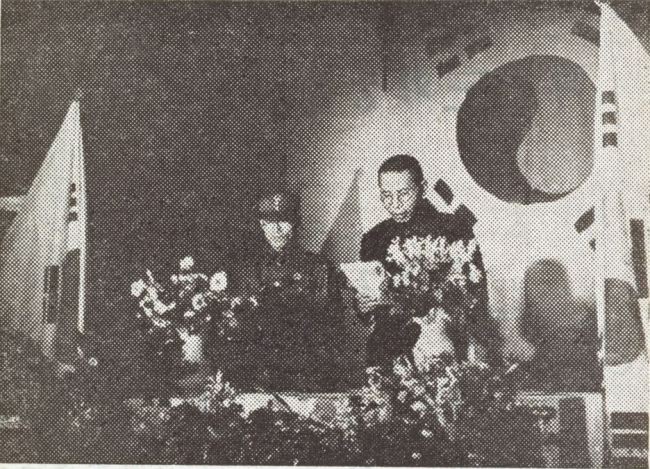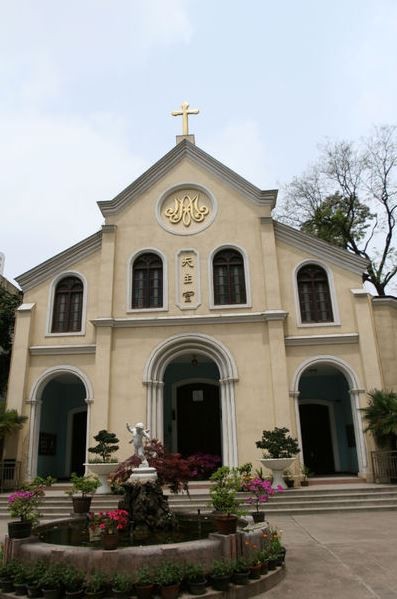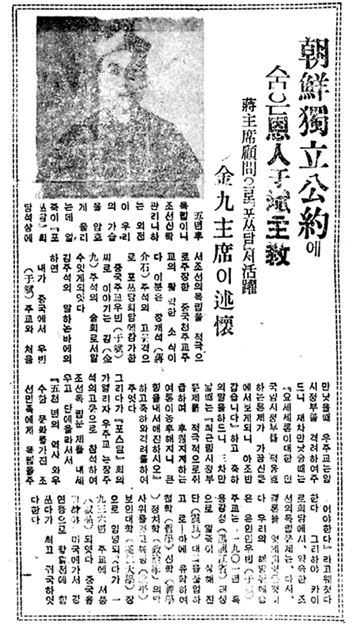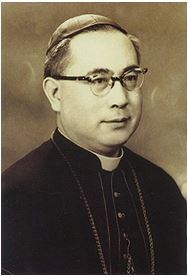[Foreigners Who Loved Korea] Paul Yu Pin, the Roman Catholic Cardinal Who Supported the Korean Independence Movement
By Korea HeraldPublished : Dec. 6, 2016 - 16:23
In late December 1945, when the issue of trusteeship over Korea became a political issue a mere two months after the Korean Provisional Government returned to the country, KPG President Kim Gu introduced the Roman Catholic bishop Paul Yu Pin to the Korean people through a newspaper article. Virtually unknown to Koreans, Yu was a great contributor to the Korean independence movement.
Unknown Chinese supporter of the Korean independence movement
The following is quoted from the Dong-a Ilbo article from Dec. 29, 1945 titled “Bishop Paul Yu Pin, the Hidden Savior of the Pledge for Korean Independence; President Kim Gu Recounts Bishop Yu’s Activities as Advisor to Chiang Kai-shek in Potsdam:”
Unknown Chinese supporter of the Korean independence movement
The following is quoted from the Dong-a Ilbo article from Dec. 29, 1945 titled “Bishop Paul Yu Pin, the Hidden Savior of the Pledge for Korean Independence; President Kim Gu Recounts Bishop Yu’s Activities as Advisor to Chiang Kai-shek in Potsdam:”

When I first met Bishop Paul Yu Pin, the cardinal expressed his support for the KPG, and the second time we met, he congratulated me, saying, “I am very glad that the topic of public opinion expressing their full support for the KPG now comes up from time to time in the newspapers.” The third time we met, he congratulated and encouraged me, saying “Recently, public opinion advocating support for and actively addressing the issue of the KPG is growing, so please keep your spirits up and do your all.”
Kim recounted how Yu had strongly supported the issue of Korean independence in the Potsdam Conference held by the leaders of the Allied powers -- the United States, United Kingdom, and Soviet Union -- before the end of World War II in July 1945. However, Yu did not in fact attend the Potsdam Conference; it seems that Kim confused Yu’s attending the Potsdam Conference with that of the San Francisco Conference.
Yu was a representative figure of those in China who supported the Korean independence movement. He was ordained as a bishop and then appointed Apostolic Vicar of Nanjing in 1936, taking great interest in and actively supporting the Korean independence movement while aiding the Chinese people in the Second Sino-Japanese War as leader of the Roman Catholics in China. He also supported the Korean independence movement in the US in particular, and was widely known among the Korean diaspora there. His close friendship with not only Kim but also Syngman Rhee also originated from these activities.
Paul Yu Pin, the “Envoy of Justice” of the Korean independence movement
Yu first directly aided the Korean independence movement when he attended the inaugural ceremony of the General Headquarters of the Korean Liberation Army held in the Jialing Hotel in Chongqing on Sept. 17, 1940. When the Nationalist government of the Republic of China moved the capital from Nanjing to Chongqing in the latter 1930s, Yu exerted his efforts in advocating for support for the government in the Second Sino-Japanese War in the US and Europe, and then returned in October 1939.

Yu was only able to meet with Korean independence activists when the KPG moved to Chongqing in 1940. At the inaugural ceremony of the general headquarters of the KLA, he delivered an address stating that the KLA would emerge victorious in the end as they were on the side of justice and fairness, and that Sino-Korean cooperation would bring happiness and peace to the world.
When the general headquarters of the KLA moved to Xian that November, Yu began recruiting Koreans and publicizing for the KLA in northern China. On Nov. 11, Yu invited the members of the KPG and KLA general headquarters to the Yi Shih Pao Company for a banquet. The Yi Shih Pao was a Roman Catholic daily newspaper run in China with Yu as its president. On Nov. 12, the Yi Shih Pao ran an article titled “The Leaders of Korea Will Soon Depart for the Frontlines” that explained the banquet and promised the 3.5 million Chinese Roman Catholics to their cause. This article was translated and published as “The Leaders of the KLA Depart for the Frontlines” in the New Korea People’s Daily on March 6, 1941.
At the banquet, Yu presented a silk banner with the words “In Support and Promotion of Justice” in Chinese characters, and in return Kim Gu presented him with a silk banner with the words “The Envoy of Justice” embroidered in Chinese characters. Thus Yu became known by this name to Koreans, and the KPG and KLA were greatly encouraged by the support they received from Yu and the Chinese Catholic Church.

Yu also actively participated and supported events linked with Korean independence activists. He attended the inauguration of the Sino-Korean Cultural Association held in Chongqing on Oct. 11, 1942, and became an honorary board member. He also donated 50,000 yuan as president of the Chinese Roman Catholic Cultural Association to the Committee for Korean-Chinese Livelihoods to promote the welfare of Koreans in China in late 1944, which demonstrated his concern for their plight.
Supporting the Korean independence movement in the US
Yu was also active abroad in the 1940s, traveling back and forth between China and the US. When he visited the US in March 1943, the KPG requested the Committee for the Federation of Korean Americans to welcome him as a guest of state, and Korean-Americans held a grand event to honor him. During his stay of one year and six months in the US, he also met with Syngman Rhee several times in Washington DC and discussed the issue of diplomatic recognition for the KPG, while meeting the President Roosevelt and carrying out other activities. He also participated as a host of the Committee for the Federation of Korean Americans’ event commemorating the loss of Korean sovereignty to Japan, and the committee presented him with a silver chalice with the following text in Chinese and English characters:
Presented to Bishop Paul Yu Pin,
Heaven has sent a man of good character and made you an Envoy of Justice in these difficult times…. As all Koreans appreciate your exhaustive efforts in supporting the Korean independence movement, we humbly present this chalice as a small token of our appreciation as the representatives of Koreans in America. We wish that you accept this gift as a memory of the Envoy of Justice’s stay in the States.
Yu replied:
I am a native of Heilongjiang. My hometown is close to Korea, and I am familiar with what goes on in Korea. Let us remember our meeting here today when I depart from Heilongjiang, passing by Uiju, to join you in Seoul to celebrate the day Korea becomes independent.
In April 1945, Yu visited the San Francisco Conference as a Chinese civil representative. Although the Korean delegation could not attend due to lack of diplomatic recognition for the KPG, Yu sought to resolve this by lobbying the US and China to support the KPG’s cause.
An Intellectual with three doctorates becomes a bishop
Born on April 13, 1901, Yu was baptized at 14 and graduated from Jilin Theological Seminary. He left China to study abroad in Rome in 1924 and studied philosophy and theology at Pontifical Urbaniana University. He acquired a doctorate in philosophy at St. Thomas de Aquinas University, and acquired doctorates in theology and politics at Urbaniana University and Perugia University in 1929 and 1933, respectively.

Although he was a Catholic, he was highly interested in Chinese culture and attempted to combine both Chinese and Western cultures. When he returned to China in November 1933, he concurrently held posts as Secretary of the Apostolic Nunciature in Beijing, China, Director of China’s Public Education Association, and rector and ethics professor of Fu Jen Catholic University.
On July 17, 1936, Pope Pius XI appointed him Apostolic Vicar of Nanjing. Thus, at the young age of 35, Yu became the bishop of Nanjing, the capital of the Republic of China. When the Second Sino-Japanese War broke out the following year, he went to Europe and requested the aid of the international community for the war. He also visited 30 major cities in the US and Canada, extensively lobbying aid for China by lecturing and appearing on broadcasts 130 times, and campaigned for support from Europe and the US for refugees when the Massacre of Nanjing occurred.
Aside from these activities, he maintained close ties with the Nationalist government, attending the National Participatory Congress established as a national policy advisory body in 1938 in order to consolidate the nation’s strength and unify national public opinion. Yu’s activities received attention from within and outside China, but he was criticized as a “political bishop” for his ties to the Nationalist government.
Visiting Korea after liberation
When he returned to China after 8 years abroad, he was consecrated as Archbishop of Nanjing in April 1946. In 1949, he moved to Taiwan by the order of the pope, and then stayed for 10 years in the US. When Fu Ren Catholic University was rebuilt in Taiwan in 1959, he returned and acted as rector, and afterwards was appointed as the second Chinese cardinal by Pope Paul VI on April 28, 1969. He and Archbishop of Seoul Kim Su-hwan were both appointed as Asian cardinals.

It was not until April 1954 when he was invited by Syngman Rhee that he was able to visit Korea; before then, he could not come despite being invited to the celebration of the founding of the Republic of Korea. Afterwards, he visited Korea four more times in May 1959, February 1961, August 1969, and April 1976.
Although the Korean government was late to recognize Yu for his contributions to the Korean independence movement, he received the Order of National Foundation in August 1969, when he came to attend the unveiling of Kim Gu’s statue on Namsan Mountain.
When Pope Paul VI passed away in August 1978, Yu went to the Vatican to attend the funeral and participate in electing a new pope, but collapsed during the funeral, passing away Aug. 16. His remains are buried in the grounds of Fu Ren Catholic University.
By Choi Ki Yeong
Sogang University History Professor
In Korea’s turbulent path toward independence and nation building, there were foreign nationals who stood steadfastly by the Korean people, although their contributions have been largely overshadowed by those of Korean patriots. The Korea Herald, in partnership with the Independence Hall of Korea, is publishing a series of articles shedding light on these foreigners, their life and legacies here. This is the 22nd installment. -- Ed
-
Articles by Korea Herald








![[Hello India] Hyundai Motor vows to boost 'clean mobility' in India](http://res.heraldm.com/phpwas/restmb_idxmake.php?idx=644&simg=/content/image/2024/04/25/20240425050672_0.jpg&u=)











